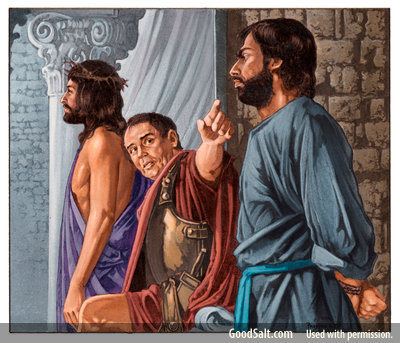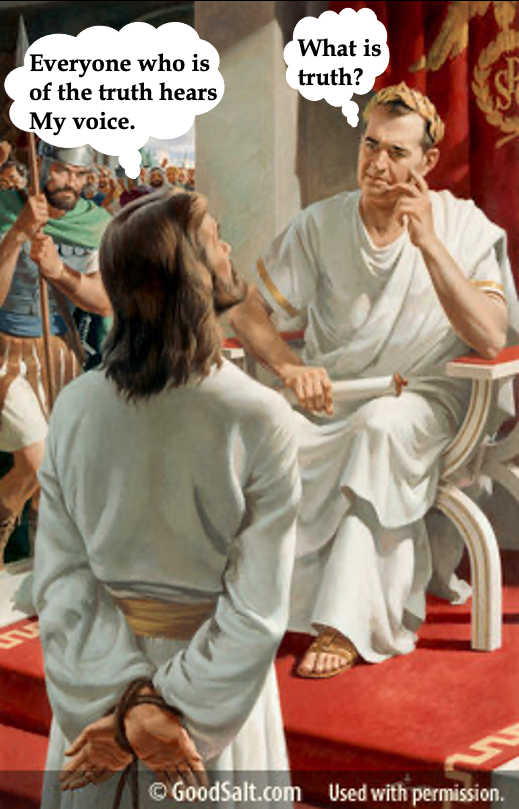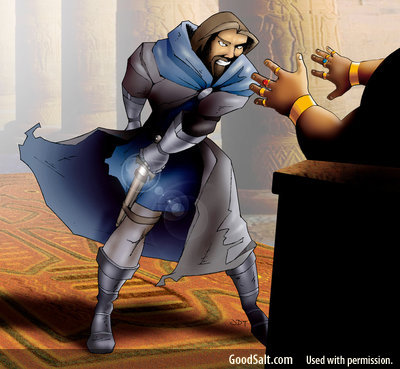“17 And He, bearing His cross, went out to a place called the Place of a Skull, which is called in Hebrew, Golgotha, 18 where they crucified Him…” John 19:17-18a
We are learning from John 19:4-42 that what happened to Jesus on the last day of His life also applies to us today. The apostle John has several images he wants to make sure that we see in the life of Jesus Christ. So far we have discovered that…
– Like Pilate, we can avoid doing the right thing because of the cost involved (John 19:4-7).
– No one has power in this world except what is given to them by God (John 19:8-12).
– The closer we get to the cross, the more clearly we see who people really are, including ourselves (John 19:13-16).
The fourth lasting lesson we learn from Jesus’ last day is that THE CROSS IS THE TOTAL EXPRESSION OF GOD’S GRACE TO US IN CHRIST (JOHN 17-18a). Before we look at today’s verses, let’s review what has happened to Jesus so far on His last day before His dead body is sealed in a tomb. Prior to His crucifixion, Jesus had already suffered a great deal. In Gethsemane, He was under such emotional distress that tiny capillaries in His sweat glands broke and mixed blood with His sweat (Luke 22:44). After He was arrested and bound, He was unjustly tried before civil and religious authorities (Matthew 26:57-68; 27:1-2; Luke 23:6-12; John 18:12-14, 19-23, 28-40). During these trials Christ was falsely accused, insulted, rejected, and physically abused. Pilate then had Jesus scourged or beaten with a short whip made of braided leather thongs to which were attached small iron balls and sharp pieces of bone (John 19:1). This scourging left Jesus’ body tattered and torn. Christ was then beaten and mocked by Roman soldiers who placed a crown of thorns on His head and a purple robe on His severely wounded back (John 19:2-3; cf. Matthew 27:27-30).
This brings us to the next image the apostle John presents to us. “And He, bearing His cross, went out to a place called the Place of a Skull, which is called in Hebrew, Golgotha.” (John 19:17). Before the soldiers had Jesus carry His cross, they removed the purple robe from Christ (Matthew 27:31) which had become adhered to the clots of blood and serum in His wounds. This would have been very painful, much like carelessly removing a surgical bandage.
When John tells us that Jesus was “bearing His cross,” we see the fulfillment of “two Old Testament symbols or types. Isaac carried his own wood for the sacrifice (Gen. 22:1-6) and the sin offering used to be taken outside the camp or city (cf. Heb. 13:11-13).” 1 So the sin of the world was placed on the innocent Lamb of God (John 1:29).
The reference to Jesus “bearing His cross” refers to the crossbeam that prisoners had to carry to their place of execution. 2 The upright part of the cross would have been out at the place of crucifixion. This crossbeam strapped to Jesus’ back would have weighed 100-150 pounds. 3 This weight would have been similar to a couple of sacks of cement.
It was a very heavy load especially for Jesus who had lost so much blood from the beating and flogging. Since Christ was very weak and faint, He could not carry this load all the way out to the place of execution. John does not tell us this because He is wanting to stress Jesus’ deity, 4 but Luke informs us that “Simon a Cyrenian,” carried Jesus’ crossbeam for Him (Luke 23:26).
The place where Jesus would be crucified was “called the Place of a Skull, which is called in Hebrew, Golgotha.” It was most likely called this because the hill’s rock formations looked like a skull. 5
John continues to describe his eyewitness picture of this when he writes, “where they crucified Him…” (John 19:18a). To help us understand the significance of John’s words, it would be beneficial for us to look at the history of crucifixion. 6
The Romans did not invent crucifixion. It was probably invented by the Phoenicians. The Phoenicians invented the cross for a very particular reason. They had a god that they served who was a god of the earth. They felt that for someone to die on the earth it would defile their god. So they ingeniously came up with a way to execute their prisoners lifted up off the earth so that they would not defile the earth. That is where it is believed crucifixion began.
Jesus made reference to His crucifixion when He said, “And I, if I am lifted up from the earth, will draw all peoples to Myself.” (John 12:32). The interesting thing is when you look at the real cross of Christ, the God of the universe was lifted up on a cross (John 1:1-3), not the god of the earth. Jesus did not defile or condemn the earth. He came to save the world (John 3:17). That is what actually took place.
The Romans looked at the cross in a different way. Through the Egyptians and then the Romans, this idea of a cross came. The Romans saw the cross as a tool. They expertly used it as a tool of torture and punishment. They also used it as a tool to tell people if you rebel against Rome, you are going to face the cross and be put out in front for the world to see. Their suffering and their pain would endure for a long time so that when they punished their prisoners, many people would be brought under their control. That is what the Romans saw it as.
The Jewish people saw the cross as the most disgusting form of death because Deuteronomy 21:22-23 says, “If a man has committed a sin deserving of death, and he is put to death, and you hang him on a tree, 23 his body shall not remain overnight on the tree, but you shall surely bury him that day, so that you do not defile the land which the Lord your God is giving you as an inheritance; for he who is hanged is accursed of God.” When God put these verses in the Bible, He knew that Jesus would be cursed for our sins on the cross.
So to the Phoenician, the cross was a means of death that satisfied their belief in a god of the earth. To the Romans, the cross became an expertly used instrument of torture and control. To the Jewish people, crucifixion represented the most disgusting form of death. But to the God of the Bible, the cross reveals the glory of Christ. To the Christian, the cross reveals Jesus’ glory, especially His amazing grace and love.
When the Bible talks about Jesus dying, it simply says, “they crucified Him.” (John 18:18a). John doesn’t go into great detail. The reason for that is he did not need to because everyone in his day understood what crucifixion was all about. If I told you that somebody died by lethal injection, you would probably understand what that means. You can visualize the table and the room and the witnesses because you may have seen it on television or in an online video. We have also heard news reports about it. In John’s day, everyone would know the truth of what the cross was all about.
The Romans had refined crucifixion to such an art, we can know what happened. 7 They had executioners whose sole job it was to carry out crucifixion time after time. So as Jesus was brought up to that hill, to the place where that standing post was, the executioner would lay the cross beam behind the victim and would jerk them to the ground across the beam. The executioners wore leather aprons. And in these leather aprons there were pouches with five-inch nails and a hammer off to the side. These were the tools of their trade.
The executioner would kneel first on the right arm of the victim of the one who would be crucified. His knee would rest on the inside of the elbow. His hand would be placed on the arm of the victim so it was flat against the cross. He would feel for the hollow spot in the wrist between the bones so that no bones would be broken or arteries broken so the prisoner would be tortured as long as possible. Then he would take one of those five-inch nails and place it against that hollow place and in one sharp blow drive it into the wood through the flesh.
They would do the left hand in the same way. Then two soldiers on each side would grab the two ends of the cross beam and on the signal, raise it up and place it into the notch of the upright post. When that crossbeam was set firmly, the executioner would reach up and set the sign that described the crime this person had committed. This was very important to the Romans because they wanted to discourage others from rebelling against Rome.
Then the executioner would kneel before the cross and take the right foot of the criminal and place it over the left foot, bending it slightly upwards and nail the feet to the cross. Remember, Romans were experts at this. They had devised a means to know the exact angle at which to put the feet so the prisoner could live the longest possible time so they could endure the greatest possible agony as an example to the watching world of why not to commit this crime.
As Jesus’ feet were nailed on the cross, we become aware of two sources of pain. First, the pain in His shoulders, His arms, and His forearms of being in a “V” position. If you tried to do this for any length of time your arms would begin to cramp. This pain would begin to be greater than the pain of the nails that were in His hands and in His feet. Then the pain of the pectoral muscles – the muscles in His chest – beginning to constrict so He could breathe in but not breathe out.
John was there. He was an eyewitness. He saw what they did to Jesus Christ. But there is something that John (and other eyewitnesses) did not see. Something, however, that Jesus did see. Max Lucado shares this insight as the soldiers were nailing Jesus’ arms to the crossbeam. “Jesus turns his face toward the nail just as the soldier lifts the hammer to strike it….
“Couldn’t Jesus have stopped him? With a flex of the biceps, with a clench of the fist, he could have resisted. Is this not the same hand that stilled the sea? Cleansed the Temple? Summoned the dead?
“But the fist doesn’t clench… and the moment isn’t aborted. The mallet rings and skin rips and the blood begins to drip, then rush. Then the questions follow. Why? Why didn’t Jesus resist?
“’Because he loved us,’ we reply. That is true, wonderfully true, but – forgive me – only partially true. There is more to his reason. He saw something that made him stay. As the soldier pressed his arm, Jesus rolled his head to the side, and with his cheek resting on the wood he saw … between his hand and the wood there was a list. A long list. A list of our mistakes: our lusts and lies and greedy moments and prodigal years. A list of our sins.” 8
The Bible tells us, “13 God made you alive with Christ. He forgave us all our sins, 14 having canceled the charge of our legal indebtedness, which stood against us and condemned us; He has taken it away, nailing it to the cross.” (Colossians 2:13-14 NIV).
Lucado continues, “The list God has made, however, cannot be read. The words can’t be deciphered. The mistakes are covered. The sins are hidden. Those at the top are hidden by his hand; those down the list are covered by his blood. Your sins are ‘blotted out’ by Jesus (KJV)…
“This is why he refused to close his fist. He saw the list! What kept him from resisting? This warrant, this tabulation of your failures. He knew the price of those sins was death. He knew the source of those sins was you, and since he couldn’t bear the thought of eternity without you, he chose the nails.” 9
Out of love for you and me, Jesus chose the nails that not only attached Him to that wooden crossbeam, but also the list of all our sins. The word “canceled” (eksaleíphō) in Colossians 2:14, was a technical term in the apostle Paul’s day when he penned this. It refers to washing a piece of parchment clean for reuse. 10 Not only was the parchment clean enough to be written on again, it showed no evidence of ever having been written on in the first place.
Jesus’ blood washed away any record of our past, present, or future sins and charges against us. This is called positional forgiveness which we receive the moment we believe in Jesus for it (Acts 10:43). That is why the cross of Christ is the total expression of God’s grace. It is through the cross that “Jesus destroyed the foundation of Satan’s strategies… 11 Satan’s methodology is one of accusation, always to increase our sense of shame which increases his control over us.” 12
The truth is, no one can successfully accuse us of wrongdoing in God’s courtroom because Jesus Christ finished paying our sin debt in full when He died in our place on that cross (John 19:30; Romans 8:31-34). When we believe in Jesus, God justifies us or declared us totally righteous in His courtroom (Romans 8:33). If God pronounced that we are not guilty, then no one – not the devil, an ex-spouse, or an unforgiving boss – can reverse His verdict. No one can successfully accuse any Christian of wrongdoing in God’s courtroom because God does not even accuse us. He justifies us the moment we believe in Jesus alone (Romans 3:28, 30; 4:5; 5:1). This is what sets us free from the shame Satan wants to control us with.
As you read this, you may be thinking, “But you don’t know how badly I have sinned or how often I have sinned.” You are correct, but Jesus Christ does. Before Jesus hung on that cross, all of your sins were yet future. At the cross, God took every sin that you would ever commit and placed them all on Jesus Christ. The Lord Jesus paid the penalty for all of your sins so you could be totally forgiven the moment you believed in Christ. Forgiveness means God has removed the barrier of all your sins so you can now enjoy closeness with God.
What this means is that you can never lose your relationship with your heavenly Father. Just as you are born into your earthly family and can never cease to be your parents’ child no matter what you do, so too, when you are born into God’s family through faith in Jesus alone (John 1:12), you can never cease to be His child no matter how you live. You can sin as God’s child without ever ceasing to be His child. But your sin will break that closeness with God just as disobeying your parents breaks your closeness with them. When you sin (and we all do), you must daily confess your sins in order to maintain fellowship or closeness with Christ (I John 1:9).
Knowing that all of your sins are positionally forgiven “in Christ” is essential for experiencing victory over the devil and the world (I John 2:12-14). A good soldier cannot do his best with the fear that a mistake or two would take him off the front lines. Satan tries to get believers to focus on their past sins or worry about their future sins to weaken them when facing the world’s temptations. By focusing on Christ’s complete positional forgiveness, a believer is able to focus on knowing Christ more intimately by abiding in His Word and experiencing victory over the devil and the world (I John 2:12-14).
Prayer: Precious Lord Jesus, there is no greater expression of Your grace than the cross. When you spread your arms out on that crossbeam, You were showing the world how wide Your love truly is (John 3:16). It is wide enough for the worst of sinners and the best of sinners to be totally forgiven forever. Your love is wide enough for the whole world which includes every one of us. Sadly, others may exclude us but You never will if we come to You on Your terms (John 6:37). Thank You for demonstrating how much You loved us when You stretched one hand to the right and the other to the left and permitted the soldiers to nail them in that position so we would know that You died loving us. Thank You for canceling the list of all our sins which was between Your hands and the wooden crossbeam through the shedding of Your blood. Please use us now to proclaim Your forgiving love and grace to a lost and dying world. In Your matchless name we pray, Lord Jesus. Amen.
ENDNOTES:
1. Edwin A. Blum, The Bible Knowledge Commentary Gospels, Editors John F. Walvoord and Roy B. Zuck, (David C Cook, 2018 Kindle Edition), pg. 690.
2. J. Carl Laney, Moody Gospel John Commentary (Chicago: Moody Press, 1992), pg. 345; Tom Constable, Notes on John, 2017 Edition, pg. 351, cited Darrell L. Bock, Jesus according to Scripture: Restoring the Portrait from the Gospels (Grand Rapids: Baker Book House; and Leicester, England: Apollos, 2002), pg. 535.
3. Tom Holladay’s July 24, 1996 message entitled, “A Day in the Life of… Jesus Christ.”
4. Tom Constable, Notes on John, pg. 351.
5. Robert Wilkin; J. Bond; Gary Derickson; Brad Doskocil; Zane Hodges; Dwight Hunt; Shawn Leach. The Grace New Testament Commentary: Revised Edition (Grace Evangelical Society, Kindle Edition, 2019), pg. 559; cf. Edwin A. Blum, The Bible Knowledge Commentary Gospels, pg. 690.
6. Adapted from Tom Holladay’s discussion in his July 24, 1996 message entitled, “A Day in the Life of… Jesus Christ.”
7. Ibid.
8. Max Lucado, He Chose The Nails (Nashville: Word Publishing, 2000), pp. 33-34.
9. Ibid., pg. 34.
10. A. T. Robertson, Word Pictures in the New Testament, Vol. IV (Nashville, TN: Broadman Press, 1931), pg. 494.
11. Ted Roberts, Seven Pillars of Freedom Workbook (Gresham, OR: Pure Desire Ministries International, 2014), pg. 72.
12. Ted Roberts, Pure Desire (Bloomington, MN: Bethany House Publishers, 1999), pg. 83.







